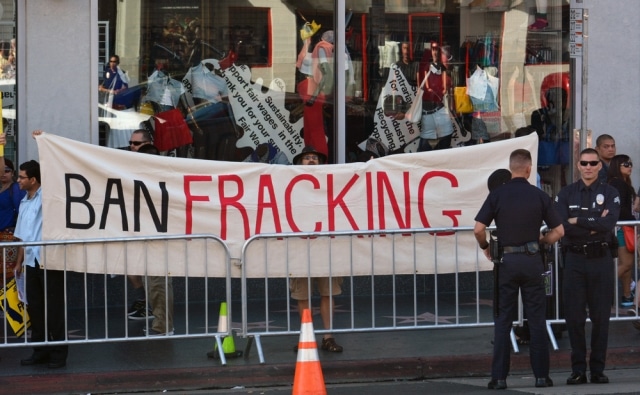Yesterday’s elections sent several more climate deniers to a dirty energy money-rich Congress, where they’re already sharpening their knives and preparing to cut the centerpiece of President Obama’s climate agenda, the EPA‘s Clean Power Plan, to shreds.
Erich Pica, president of Friends of the Earth, summed it up succinctly: “With a tremendous amount of spending, the Koch Brothers have literally purchased the best Congress they could buy. It is now up to President Obama to pursue aggressive executive action on our pressing environmental issues, including climate change and clean water protections.”
But it was not all bad news for the climate yesterday, because many communities are not content to wait on the President to take action: Citizen-led initiatives to ban fracking won big in California, Ohio, and Texas.
The biggest of these victories was undoubtedly won in Denton, TX. A small city northwest of Dallas, Denton already has 275 fracked wells. Locals’ concerns about fracking’s impact on health and the environment led to a landslide 59% to 41% win for the measure, which bans fracking within city limits.
Cathy McMullen, a nurse and president of Frack Free Denton, said in a statement on the group’s website, “This ban is the voice of the citizens of Denton speaking directly to the fracking industry, and local, state and national government: WE HAVE HAD ENOUGH.”
The fact that this happened in Texas, the biggest producer of oil and gas in the nation, speaks to how rapidly the American public is waking up to the dangers of fracking.
Revelations in early September that 30% of the water wells sitting atop the Barnett shale, one of the nation’s largest natural gas reserves, contain unsafe levels of arsenic, might have factored into the overwhelming passage of the fracking ban. Denton sits on the edge of the Barnett shale, where fracking is said to have been invented.
Earthworks energy program director Bruce Baizel asks the key question that is sure to keep oil and gas industry execs up at night: “If this place in the heart of the oil and gas industry can’t live with fracking, then who can?”
As expected, the industry immediately struck back. The Texas Oil & Gas Association filed an injunction against the city on Wednesday morning, just hours after the ban was approved by nearly 60% of voters, in an attempt to block its implementation.
Cathy McMullen is not worried about the legal challenges. In fact, she’s more defiant than anything else.
“We lawyered this ban every which way before launching this effort,” she said in her statement. “And we’re confident it will stand up. We know the oil and gas industry is going to try to use our own state government against us by directing its paid flunkies to overturn the ban in the legislature. To them I say, if you vote to overturn this ban, never again say you’re against big government… Because politicians didn’t pass this ban.”
Meanwhile, Athens, Ohio became the state’s fifth city to ban fracking by adopting a “Community Bill of Rights,” a concept created by the Community Environmental Legal Defense Fund for enshrining in law a municipality’s or county’s right to “move away from unsustainable projects and practices at the cost of communities and nature, and toward community decision-making.”
Mendocino County, California voters also approved a Community Bill of Rights yesterday when 67% voted for Measure S, which will ban fracking and assert the right to “natural and chemical free communities and ecosystems, a clean environment, and self-government by the people, without manipulation and overwhelming influence from corporations.”
San Benito County, California voters approved Measure J, a ban on fracking, by a wide margin as well. Some 57% of residents voted to prohibit not just fracking and other high-intensity oil extraction methods like acidization and cyclic steam injection, but also any new conventional oil and gas activities in areas zoned for residential or rural land use, despite the fact that the oil indusry outspent its anti-fracking opposition roughly 13 to 1.
One noteable loss was in Santa Barbara County, California where a ban on fracking, Measure P, went down in defeat. The oil industry made it clear that this was a crucial fight by spending massive amounts of money to defeat Measure P.
A last-minute cash infusion brought the total spent by the oil industry to defeat the fracking ban up to $6.4 million, more than was spent on any Congressional race in California. The community-led Yes on P campaign spent about $300,000, money it raised mostly from small donors.
The No On P campaign, spearheaded by an industry front group called Californians for Energy Independence, was funded entirely by oil companies like Chevron, Occidental Petroleum and Exxon.
“We are immensely proud of the true grassroots nature of this campaign,” says Rebecca Claassen, Campaign Chair for Yes on P, “standing in stark contrast with the outside interest solely focused on profits.”
Adam Scow of Californians Against Fracking and Food & Water Watch says that the oil industry was desperate to defeat Measure P becaue of plans for more than 7,000 new oil wells in Santa Barbara County, some of which will use cyclic steam injection, which Measure P would have prohibited. But he says Californians concerned about fracking are undaunted by the setback.
“Despite the oil industry’s aggressive efforts to spread misinformation, San Benito, Mendocino and Santa Barbara voters waged a historic effort to ban fracking in their communities and protect the health of their neighborhoods and the environment,” Scow says. “The defeat of Measure P in Santa Barbara does not diminish the reality that residents throughout California are standing up in growing numbers to protect their homes, schools and our state’s vulnerable water supplies.”
Image Credit: Dan Holm / Shutterstock.com
Subscribe to our newsletter
Stay up to date with DeSmog news and alerts







